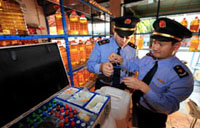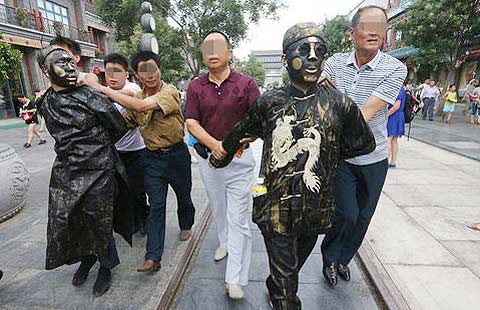Food scandal may be tip of iceberg
Updated: 2014-07-21 14:54
By Xin Zhiming (chinadaily.com.cn)
|
|||||||||||
It is shocking to discover that Husi Food, a Shanghai distribution company supplying meat to international fast-food giants such as McDonald’s and KFC, has long been using stale products.
|
 China raises safety concerns over 'blood' drinks |
|
 China serves up new food safety penalties |
The company allegedly tried to block investigation by officials of the Shanghai food and drug authority who were prevented from entering premises for an hour after arriving, arguably enough time for the company to destroy evidence and conceal problem food items.
It is shocking not only for the law violation, but also because Husi, a member of the US-based food conglomerate OSI Group, has so far been seen as a player that abides by laws and regulations. It was even listed by local government as a food safety model company.
If such a company blatantly violates food safety regulations it is virtually impossible for consumers to have confidence in any of the processed food sector.
According to China’s food safety law, Husi could be fined up to 10 times the value of the illegally processed food and, in the most serious case, have its license revoked.
The nation is watching to see the results of the investigation and what punishment is meted out.
The incident will deal a heavy blow to the sector and it will take long time to repair consumer confidence.
It is important to learn lessons and rethink food safety management.
The Husi incident is not the first case in which reporters have found dubious corporate behavior while regulators only step in after reports are broadcast.
Regulators can argue they have conducted regular checks, only to find no major problems but for big companies like Husi, it is easier to conduct on-the-spot checks. Why have the regulators still failed to dig out major problems in those big companies?
Media reports show that many checks are open inspections known to corporate managers beforehand. The mangers have ample time to ensure illegal operation, if any, is not discovered. Obviously, regulators should conduct more uninformed food safety checks.
Meanwhile, relevant laws and regulations should be revised to add details as to how the power of regulators in conducting uninformed checks can be guaranteed and how those who block such checks should be punished.
Regulators, given the importance of their work, should be put under proper scrutiny. If any evidence is found that they have failed in their duties, they should also be punished.
Such a change will add to the workload of food safety regulators but it is worth the effort to improve food safety standards.
Related Stories
60 hospitalized over suspected food poisoning 2014-07-08 17:32
China Food and Drug body passes WHO evaluation 2014-07-04 19:58
Liability insurance proposed for food industries 2014-07-03 07:40
Opinions solicited on food safety law 2014-07-02 19:21
Today's Top News
5 more universities set up human rights centers
Rebels likely downed jet 'by mistake'
Jakarta governor wins Indonesian presidency
Black boxes handed over from crash site
News as fast food not a healthy diet
Huawei bolsters UK presence
EU extends sanction relief on Iran
Int'l investigation team on MH17 formed
Hot Topics
Lunar probe , China growth forecasts, Emission rules get tougher, China seen through 'colored lens', International board,
Editor's Picks

|

|

|

|

|

|





